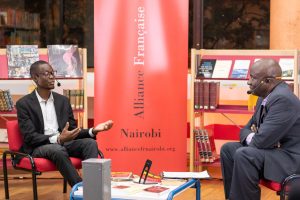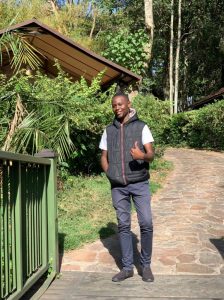In the 5th issue of the PoeticAfrica Trilingual Magazine, Elizabeth Akunyili (Nigeria) sits for a moment with Benny Wanjohi (Kenya) to learn more about what his motivations are. Please enjoy the chat and do remember to leave a comment in the comment box at the bottom of the page.
EA: Good morning Benny, how are you today?
Benny Wanjohi: Good morning Liza, I am doing well. How are you?
EA: I am excited! I get to talk to The Benny! What is the meaning of your name? I am curious. African names always have beautiful interpretations.
BW: The pleasure is all mine. I did not see this coming. If I knew, I would have asked that we edit the part. I suppose you are talking about Wanjohi; which would loosely translate to ‘of the beer’. However, I do not use beer products.
EA: What would you have preferred we talked about?
BW: I have interacted with your interviews elsewhere and having worked with you in the same team for the Poetic Africa magazine, I know you are as random as it gets. I am prepared for anything.
EA: That’s good to know. Tell me about your writing journey?
BW: When I was young, I would always read newspapers which were used then to wrap meat that we would buy from butcheries. I also remember writing a composition on my journey to Mombasa when I was in Standard 5 in primary school which my teacher read to the whole class. There was nothing spectacular about my writing until later in high school when I would participate in Kenyan music festivals, reciting poems with a school group at the national levels. Then a silent period between then and 2011.
Sometime in 2011, I wrote two poems in an end year event of a small group I was in. Then wrote two poems in 2012 and 2014 respectively. In 2015, with the wider establishment of Whatsapp in Kenya, I started writing poems to friends during their birthdays. That was it until later in 2017, when I started sharing poems on Facebook. Friends thought I was a writer and here we are.
Read about – Nathaniel Z Mpofu – Multi-Award-Winning Zimbabwean Author
EA: ‘Friends thought I was a writer’. That’s peculiar. Support systems. How old were you in standard five?
BW: Yeah, it first came from others. I was ten years old then.
EA: That’s awesome. What were your favourite reads as a child?
BW: Generally, all stories from the school English and Swahili textbooks. The Old Testament of the Bible was also a favourite. Surprisingly, I never liked the children’s Bible storybooks as much. As I grew older, I fell in love with the Moses series of storybooks by Barbara Kimenye.

An interview on poetry with JSO Sibi Okumu at the Alliance Francaise de Nairobi.
EA: So, Barbara Kimenye is an influencer to your reading habit?
BW: I would say her books played a big part in the formation of my reading culture. Sometimes the temptation to read these books under the desk when the teacher was in class was so tempting.
EA: But you did! So, who are your favourite writers right now?
BW: There were repercussions. For example, one teacher picked a book I was reading and never returned it. Right now I have no favourites, but I read randomly such as the poetry of John Piper, Maya Angelou, Kolabomi Adeko, Anthony Onugba, Comfort Nyati, Rupi Kappur and the upcoming Amanda Gorman. I studied the works of two late Christian poets, Dante Alighieri and Christina Rosetti, that have had the most influence on my poetry in general.
EA: Oh wow! What was it about Alighieri and Rosetti that made the most impact on your writing?
BW: Just how much they revered God in their lives in spite of their super poetic talents. Their poetry has been studied widely all across the globe.
EA: Interesting. Does that mean your poetry is more spiritual?
BW: It would depend on how you look at it. For example, my anthology Phases of Life is a collection of poems on spirituality based on Christianity while my other anthology After Sunset and Other Poems has more of African poetry.

Benny Wanjohi
EA: That’s really beautiful. A balance of culture and spiritual inclination. As a writer, what’s your motto, your drive or say your vision as you write? What effect do you write to achieve?
BW: Hope! The world has its fair share of desperation. A quick look will inevitably present to you, an exhibit of suffering children, homeless refugees, jobless youths, broken families, depressed people, the sick and the aged, poor societies, mentally ill professionals, suicidal students.
Everyone seems to be in a battle within themselves about something. My goal is that, as I live, and centuries after I am long gone, someone will read those simple poems and find hope to face their next moment, to reconcile with their own downsides and to face life afresh.
EA: Wow! Such noble ambitions! Aside poetry, what else do you write?
BW: I am everything poetry! I do focus on a few academic research papers on a range of topics under professors who are my tutors in a course that I am studying, but that aside I am everything poetry.
EA: Nice. Do you teach other people how to be poets? How would you recommend we learn poetry?
BW: I teach other people poetry, just not how to be poets. I think there must be a thing that has to do with inherent talents and interests when it comes to art, which poetry is. As an art, it goes without saying that both theory and practice come into play as the best way to learn. While one might naturally be good, consistency allows more refinement.
Read about Rachael Twinomugisha – The Ugandan Writer, Lawyer, and Teacher
EA: True. Like I have been an inconsistent poet and now I do not feel pumped to apply for competitions. If you could address all African Writers right now, I want you to imagine full-time writers, part-time writers who are experts in other fields, students who write as a hobby…what would you say to them?
BW: Just like actual travelling, words have the ability to take anyone to parts of the world they have never been. Africa has a greater capacity in many fields of the current global arena. The African writer of the past has done his part to put Africa to its current state of global presence and developmental participation. A huge gap remains for the African writer of today, young or old, upcoming or established, male or female. Their pen can be the voice that advocates for rights, the platform that catapults reforms, the instrument that shapes the continent to betterhood and the rhythm that shouts that, “We are Africa, we are not a dark continent, we are authentically us!”
EA: This is a lot of motivation. Would you like to break it down into action points, specific areas of writing, potential topics etc. Something younglings like myself can run with?
BW: Established writers already know their topical focus, best genre and target niche. If young writers focus on developing and establishing these, then it will be easy to have an area that their writing can impact. A writer who is a medical practitioner, for example, would most likely write articles in that field. Who knows that even professors and researchers and other scholars from Africa and beyond would use their works for citations and research? A writer who runs a blog for traveling would also offer recreational information for such a niche. It is that kind of artistic influence with a transformative ability not only for Africa but the world that I am looking at.
EA: Wow, great! Examples worked!!! Thank you so very much for letting me interview you, Benny. I hope I get to do this again, soon.
BW: Thank you Liza for having me.
This chat was published in the 5th Issue of PoeticAfrica magazine.
Please click here to download.
This Magazine is published by a team of professionals and downloadable for free. If you would like to support our work, please buy us coffee – https://www.buymeacoffee.com/wsamagazine







